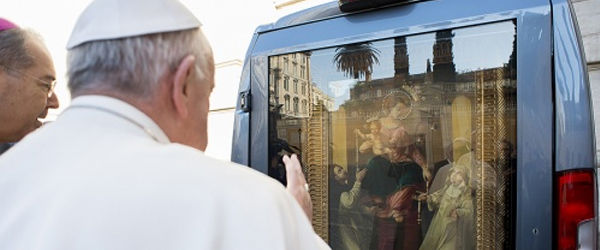At his April 27 workshop at the Earnest N. Morial Convention Center in New Orleans, Baxter’s presentation centered on new educational models being implemented in the Archdiocese of Los Angeles and the need to think in a different way about how schools are financed so that they are sustainable for future generations.In his 63-page book, Baxter urges educators to use innovation and creativity to help stimulate renewed interest in Catholic education. Maintenance of schools’ Catholic identity, said Baxter, remains paramount.“We have one core non-negotiable: our schools will be completely and unapologetically Catholic, and Catholic identity will be a tangible presence in all of our schools,” said Baxter. “After that, however, everything else is an opportunity to innovate.”The formation of Catholic school teachers is essential in assuring that Catholic identity remains strong. “With the increase in lay people staffing Catholic schools,” Baxter added, “it is imperative that Catholic educators are fully-formed in the faith and that they truly understand their obligations to be models for their students and families.”He lists several creative innovations in the book to re-invent the wheel of Catholic education and to bring forth systems that will be most viable to 21st century learners. Examples include grade-specific schools, dual-language immersion schools and utilizing technology integration more effectively throughout the curriculum.Other innovations include operating with a mixed-age model, better inclusion of students with learning challenges and subject-specific schools.The book also discusses the move to a 200-day calendar in the Catholic elementary schools in Los Angeles and the opportunity it provides to delve deeper into curriculum. It also allows schools to address all levels of student achievement from remediation, enrichment and acceleration, and allows a focus on STEM subjects --- Science, Technology, Engineering and Math. By the 2012-13 school year, it is anticipated that more than 80 percent of the elementary schools will be on an extended academic calendar. Baxter affirms school administrators’ abilities to choose what will work best for the growth and development of each school. While he recognizes some bumps in the process of growth, he believes that in recognizing these challenges comes the need to take the necessary steps to seek solutions and remedy the situation.He uses the term “strategic patience” to describe the path for the future, a future which builds on one step at a time. As he says about Catholic school teachers, “Those dedicated individuals in Catholic education today are setting the context for those who will come in the future.“We follow living saints who built and nurtured Catholic schools for so many years with great sacrifice and dedication…. Our obligation is to deal with the issues we face and create viability moving toward the future. And we must maintain our faith that our work is God’s work.”Fidela B. Suelto, MA, is principal of Holy Family School, Glendale. To order “Changing the Ending,” call (800) 711-6232, or click on http://www.amazon.com/Changing-Ending-Kevin-Baxter/dp/1558334866/ref=sr_1_1?ie=UTF8&s=books&qid=1307375518&sr=8-1{gallery width=100 height=100}gallery/2011/0617/book/{/gallery}

